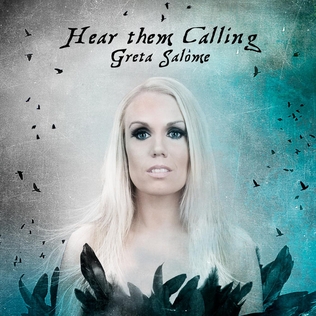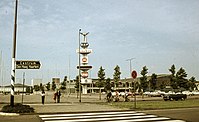Greece participated in the Eurovision Song Contest 2014 with the song "Rise Up", written and performed by Freaky Fortune and featuring RiskyKidd. The Greek entry was selected through the four-participant national final, titled Eurosong 2014 – a MAD show, which was developed by interim Greek broadcaster Dimosia Tileorasi (DT) and organised and produced by the private music channel MAD TV.
Norway participated in the Eurovision Song Contest 2015 with the song "A Monster Like Me" written by Kjetil Mørland. The song was performed by Mørland and Debrah Scarlett. The Norwegian broadcaster Norsk rikskringkasting (NRK) organised the national final Melodi Grand Prix 2015 in order to select the Norwegian entry for the 2015 contest in Vienna, Austria. Eleven entries competed in a show that took place on 14 March 2015 and the winner was determined over two rounds of public televoting. The top four entries in the first round of voting advanced to the competition's second round—the Gold Final. In the second round of public televoting, "A Monster Like Me" performed by Mørland and Debrah Scarlett was selected as the winner with 88,869 votes.
Azerbaijan participated in the Eurovision Song Contest 2015 with the song "Hour of the Wolf" written by Sandra Bjurman, Nicolas Rebscher, Nicklas Lif and Lina Hansson. The song was performed by Elnur Hüseynov, who was internally selected by the Azerbaijani broadcaster İctimai Television (İTV) in March 2015 to represent the nation at the 2015 contest in Vienna, Austria. Hüseynov had previously represented Azerbaijan in the Eurovision Song Contest in 2008 together with Samir Javadzadeh where they placed eighth with the song "Day After Day". The song "Hour of the Wolf" was presented to the public on 15 March.
Belarus participated in the Eurovision Song Contest 2015 with the song "Time" written by Uzari, Gerylana and Maimuna. The song was performed by Uzari and Maimuna. The Belarusian entry for the 2015 contest in Vienna, Austria was selected through a national final organised by the Belarusian broadcaster National State Television and Radio Company of the Republic of Belarus (BTRC). The national final consisted of fifteen competing acts participating in a televised production where "Time" performed by Uzari and Maimuna was selected as the winner following the combination of votes from a jury panel and public televoting.
Georgia participated in the Eurovision Song Contest 2015 with the song "Warrior" written by Nina Sublatti and Thomas G:son. The song was performed by Nina Sublatti. The Georgian broadcaster Georgian Public Broadcaster (GPB) held a national final in order to select the Georgian entry for the 2015 contest in Vienna, Austria. An open call for submissions was held which resulted in the shortlisting of five entries that were presented to the public on 31 December 2014. The public had until 14 January 2015 to vote for their favourite song. The results of the public televote combined with the votes of an international jury resulted in the selection of "Warrior" performed by Nina Sublatti as the Georgian entry.
Montenegro participated in the Eurovision Song Contest 2015 with the song "Adio" written by Željko Joksimović, Marina Tucaković and Dejan Ivanović. The song was performed by Knez, who was internally selected by the Montenegrin broadcaster Radio i televizija Crne Gore (RTCG) to represent the nation at the 2015 contest in Vienna, Austria. Songwriter Željko Joksimović represented Serbia and Montenegro in the Eurovision Song Contest 2004 with the song "Lane moje" and Serbia in the Eurovision Song Contest 2012 with the song "Nije ljubav stvar" where he respectively placed second and third in the grand final of the competition. Knez was announced as the Montenegrin representative on 31 October 2014, while his song, "Adio", was presented to the public on 17 March 2015.
Greece participated in the Eurovision Song Contest 2015 with the song "One Last Breath", written by Efthivoulos Theocharous, Maria Elena Kyriakou, Vaggelis Konstantinidis and Evelina Tziora and performed by Kyriakou. The song was selected through the five-participant national final, Eurosong 2015 – NERIT & MAD show, developed by NERIT and organised and produced by the private music channel MAD TV.
San Marino participated in the Eurovision Song Contest 2015, held in Vienna, Austria. The Sammarinese national broadcaster Radiotelevisione della Repubblica di San Marino (SMRTV) internally selected Anita Simoncini and Michele Perniola with "Chain of Lights" to represent the nation in the contest. Both Simoncini and Perniola had previously represented San Marino in the Junior Eurovision Song Contest on separate occasions. The 2015 entry in the Eurovision Song Contest was promoted through the creation of a music video, a tour that included a stop in Moscow and a contest on social media that awarded prizes to winning participants. San Marino performed third in the second semi-final, held on 21 May 2015, and placed 16th with 11 points, failing to qualify for the final.
Albania participated in the Eurovision Song Contest 2015 in Vienna, Austria, with the song "I'm Alive" performed by Elhaida Dani. Dani was chosen through the national selection competition, Festivali i Këngës, organised by Radio Televizioni Shqiptar (RTSH) in December 2014. Dani emerged as the winner of contest with the song "Diell"; however the song withdrawn as the Albanian entry at the request of one of the song's songwriters and replaced with "I'm Alive". Prior to the 2015 contest, Albania had participated in the Eurovision Song Contest 11 times since its first entry in 2004.
The Czech Republic participated in the Eurovision Song Contest 2015 with the song "Hope Never Dies" written by Václav Noid Bárta and Tereza Šoralová. The song was performed by Marta Jandová and Václav Noid Bárta, who were internally selected by the Czech broadcaster Česká televize (ČT) to represent the nation at the 2015 contest in Vienna, Austria. The Czech broadcaster Česká televize (ČT) announced in November 2014 that it would be returning the Eurovision Song Contest after a five-year absence. Jandová and Bárta and the song "Hope Never Dies" were announced as the Czech entry on 31 January 2015. The song was presented to the public on 10 March 2015.
Albania participated in the Eurovision Song Contest 2016 in Stockholm, Sweden, with the song "Fairytale" performed by Eneda Tarifa. The nation's entry was selected in December 2015 through the national selection competition Festivali i Këngës organised by Radio Televizioni Shqiptar (RTSH). Initially titled "Përrallë", the song was remastered and translated into English for its Eurovision participation.
Cyprus participated in the Eurovision Song Contest 2016 with the song "Alter Ego" written by Minus One and Thomas G:son. The song was performed by the band Minus One, which was selected by the Cypriot broadcaster Cyprus Broadcasting Corporation (CyBC) in November 2015 to represent Cyprus at the 2016 contest in Stockholm, Sweden. The Cypriot song, "Alter Ego", was presented to the public on 22 February 2016.
Australia participated in the Eurovision Song Contest 2016 with the song "Sound of Silence" written by Anthony Egizii and David Musumeci. The song was performed by Dami Im, who was internally selected by the Australian broadcaster Special Broadcasting Service (SBS) to represent that nation at the 2016 contest in Stockholm, Sweden. Im was announced as the Australian representative on 3 March 2016 during the Sydney concert of Conchita Wurst, Austria's Eurovision Song Contest 2014 winner. The song Im performed, "Sound of Silence", was presented to the public on 11 March 2016.
Greece participated in the Eurovision Song Contest 2016 with the song "Utopian Land" written by Vladimiros Sofianidis and performed by the band Argo. The song was internally selected by the Greek broadcaster Hellenic Broadcasting Corporation (ERT) to represent Greece at the 2016 contest in Stockholm, Sweden. Argo were announced as the Greek representatives in February 2016, a month before their song "Utopian Land" was presented.
Poland participated in the Eurovision Song Contest 2016 with the song "Color of Your Life" written by Andy Palmer and Kamil Varen. The song was performed by Michał Szpak. The Polish broadcaster Telewizja Polska (TVP) first announced in October 2015 that the Polish entry for the 2016 contest in Stockholm, Sweden would be selected through an internal selection. However, the broadcaster later decided to organise the national final Krajowe Eliminacje 2016 in order to select the Polish entry. The national final took place on 5 March 2016 and featured nine entries. "Color of Your Life" performed by Michał Szpak was selected as the winner after gaining 35.89% of the public vote.
Russia participated in the Eurovision Song Contest 2016 with the song "You Are the Only One" written by Philipp Kirkorov, Dimitris Kontopoulos, John Ballard and Ralph Charlie. The song was performed by Sergey Lazarev who was internally selected by the Russian broadcaster All-Russia State Television and Radio Broadcasting Company (VGTRK) to compete at the 2016 contest in Stockholm, Sweden. Lazarev's appointment as the Russian representative was announced on 10 December 2015, while the song, "You Are the Only One", was presented to the public on 5 March 2016.
San Marino participated in the Eurovision Song Contest 2016, held in Stockholm, Sweden. The Sammarinese national broadcaster Radiotelevisione della Repubblica di San Marino (SMRTV) internally selected Turkish singer Serhat with "I Didn't Know" to represent the nation in the contest. The song was written by Olcayto Ahmet Tuğsuz and Nektarios Tyrakis and was presented to the public on 9 March 2016 alongside its music video. While initially a ballad version had been selected, SMRTV subsequently opted to use the disco version of the song for the contest based on feedback from the public. To promote the entry, Serhat embarked on a promotional tour across Europe in the lead up the Eurovision Song Contest. San Marino performed eighth in the first semi-final, held on 10 May 2016, and placed 12th with 68 points, failing to qualify for the final.

"Hear Them Calling" (originally released as "Raddirnar" is a song performed by Icelandic singer Greta Salóme. The song represented Iceland in the Eurovision Song Contest 2016 held in Stockholm, Sweden after winning Söngvakeppnin 2016, Iceland's national final for the Eurovision Song Contest 2016. The song did not qualify for that year's Grand Final, only earning 51 points, managing a 14th place finish in the first semi-final.

"Utopian Land" is a 2016 song by Greek band Argo. The song represented Greece in the Eurovision Song Contest 2016 held in Stockholm, Sweden after being internally selected by Hellenic Broadcasting Corporation (ERT), Greece's broadcaster for the Eurovision Song Contest. The song would proceed to compete in that year's first semi-final, failing to qualify. The song scored 44 points, well enough for a 16th place position in the semi-final.






